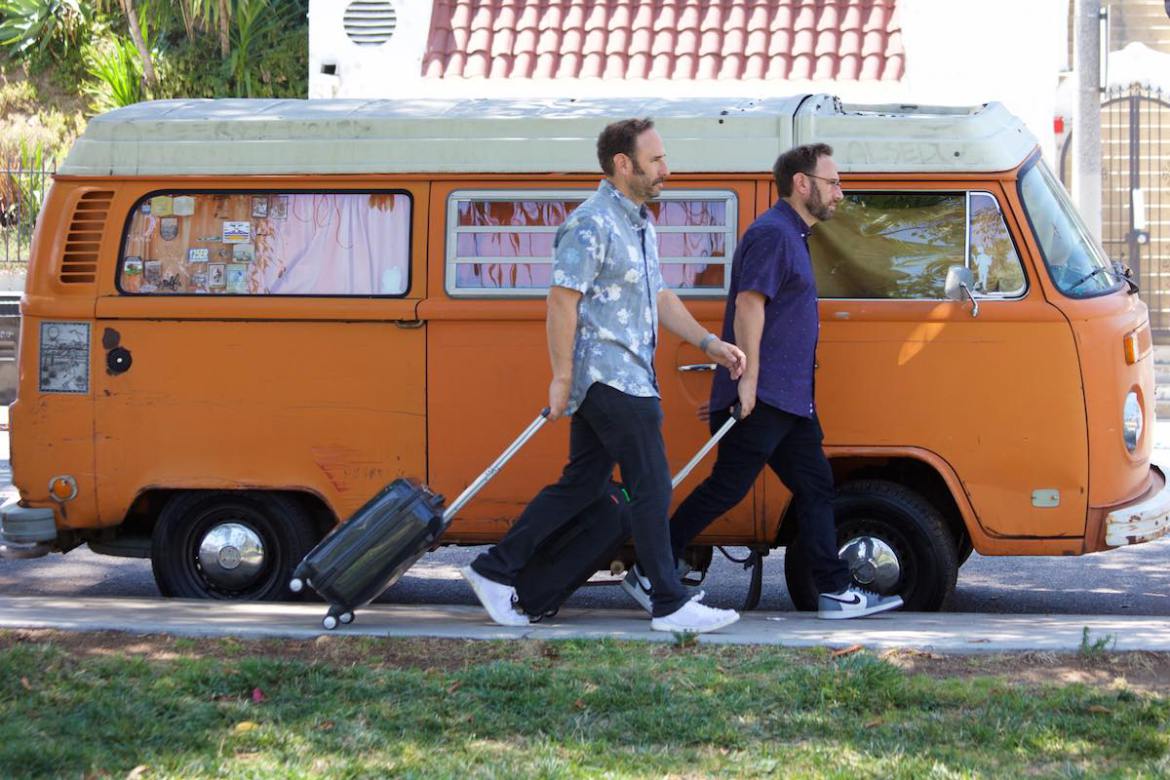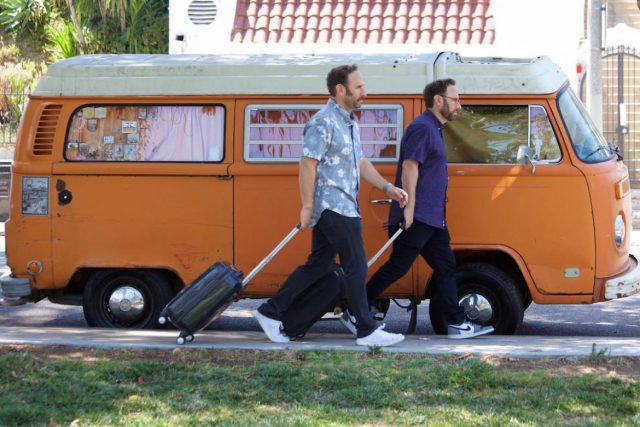The Challenge of a Divided Nation: The Sklar Brothers Take You on a Seven Hour Ride Through America With a Little Help From Scott Rogowsky

Sklars and Stripes Embraces the Challenge of a Divided Nation Circa 2017
I still remember texting a comedian friend of mine a few days after the 2016 election, asking in earnest, “when are we going to be funny again?” While I wasn’t yet in the practice of telling jokes, it mattered to me that the feeling of wanting to laugh remained even as so much around me had changed. Little did I know: hours from where I was, Randy and Jason Sklar were preparing to test the premise in a yearlong project.
Sklars and Stripes, their audio documentary released this spring on Audible, is the product of a year’s travels around the country to test a theory: with a short time in the city, armed only with the attractions and the recommendations of strangers, they could tell jokes that captured the essence of their current surroundings. As it happens, the project began in San Diego days after the election. What was originally designed to be an experiment testing their comedy prowess, quickly evolved into something bigger, weightier.
“Half of it was, this is what a year of standup looks like for people at our level,” Randy told me in an interview to talk more about the project. “We do a couple of festivals, we do a lot of clubs, these are the cities we go in…this is the process if you ever were wondering what’s it like to be standup comedians and how they do it, that’s number one. Number two: how, what’s it like to be in these cities right now in 2017?” The pair admits there was a great deal of nervousness that surrounded that first show- first, because of the newness of the project; but also because of their unsureness about audience temperament. “Needless to say, we were not looking forward to it. We were like, ‘are people even gonna laugh?’ What is gonna happen?”, Randy remembers. Jason jumped in to add, “Are we gonna be even anything but venomous on stage? Or angry?”
Not only were they able to find laughs in that fraught political moment, but they went on to do so over the course of a remarkable political moment. The audio doc took the team to nine additional cities including Kansas City, Tulsa, Bloomington, IN, Madison, WI, and ended in their own hometown of St. Louis. With them for the ride as producer was Scott Rogowsky (now of HQ fame). How did he get involved? “It’s a typical friendship, I guess. It just becomes a thing over time,” the producer affectionately known as “Rags” shared. “We started professionally doing some things together and got to know each other a little better. I’ve always been a huge, huge fan of theirs, going back to their standup specials on Comedy Central and Cheap Seats, so just to even work with them back in the day, those first instances, was amazing, such a thrill for me.”
From what the Sklars shared, that admiration and amazement is wholly mutual. “This is why he was great. We respected his comedy, and his ability to create comedy so much, and you heard him throughout– you heard his contributions in the thing, and you understand how funny he really is. Some of the jokes that he pitched to us in the moment we would take and develop into our own voice a little bit. But the kernel of it, or the joke, that came from him? Those jokes would destroy. And he was great at that.” A fun additional tidbit to the doc? Getting to explore the joke writing process of comedians. “How does an idea or an observation go from being an idea that turns into a joke that turns into a polished bit that goes on stage. You actually get to see that whole process play out in each city by writing material about what we’re experiencing,” the Sklars explained. Rogowsky affirmed the soundness of the strategy, noting that it has informed how he now imagines and writes jokes:
“I sleepwalk through most of my life, and that’s what a lot of people do. And that’s…. to be a good comedian, you have to be aware of certain things. Like, look at the world differently than these people. Part of that is just looking at the world. Not necessarily differently! Lots of people just don’t look at the world. That’s why it’s so interesting when we tell these jokes in certain cities, people come up: “I’ve lived here 20, 30 years, and I’ve never thought of it that way!”
When asked what he wants people to take away from the full listening experience (the full “doc” is a seven-hour listen, albeit a fascinating and fun one), Rogowsky alludes to that final point. “You’ll [also] be inspired to travel, to learn more about these places, and maybe inspire yourself to look at your own city through this lens. To think, what’s funny about where I live? And maybe inspire some future comedians in the process!”
By the way, the experiment – to land in a city and tell jokes that captured an understanding of the circumstances – was a roaring success…on tape. It was revealed that in Minneapolis, where the pair performed after Sklars and Stripes taping had concluded, joking about current events (failing to reach the Super Bowl, in a year you’d be hosting it) did not go over well. However, when doing something similar in Cleveland, the pair realized what it takes to make such a joke work. “I think we learned from our Minnesota experience, which was…the Minnesota experience was ‘ha ha, the joke’s on you. We’re making a joke at your expense.’ And, you know, some comedians can pull that off, and sometimes we can pull it off. But I think the subtle shift in this Cleveland experience was, “we’re with you- it’s ridiculous, we’re going to exaggerate how ridiculous this is so we can all be like, ‘let’s get out the laugh.’” It’s the only thing we can do at this point.”
Sklars and Stripes is riotously funny, inspired in large part by exploring the cities they visited and speaking with locals at every turn. Rogowsky noted that the last bit was essential to the tight timeline the pair held themselves to. “There’re a lot of things you don’t hear, it’s just them running these jokes on random strangers, which I think is the way to do this. If you’re going to have these jokes work, without the benefit of weeks or months of writing and rewriting and testing at open mics, etc.” The Sklars themselves echo that: “And that’s what this whole experience has taught us: that we can write comedy fast, and to the point, and really it’s documenting what we’re experiencing- and find connections from local moments to national political things.” And yet, despite the humor it was designed to provide, it also shares some poignant and thoughtful moments that reflect the precarious position many feel our nation is in.
One notable example: the Sklars visited the Negro Baseball League Museum about a month after Baltimore Orioles centerfielder Adam Jones reported a racial incident while visiting the Boston Red Sox. Jones had come to the museum to provide a donation and dedication. Known for their sports fandom (in part through ESPN Classic’s Cheap Seats), the jokes stop in this section for long enough to acknowledge the gravity of the moment:
“We wanted to be able to do something that felt super authentic, and could be the kind of thing that we’d listen to if we didn’t know us. And if that means hearing a description of the Negro Leagues Museum for a little while and then being in that moment with Adam Jones a week after that happened to him…we’re gonna live in that moment. It was a moment in that we were affected by it as we were traveling. We’d be affected if we were at the Negro Leagues without doing the documentary, we’d be feeling this right now. We’d be Instagramming it, and talking about it, and feeling this way.”
Even as it aims to demonstrate a humorous take on exploring the country, it is undeniably a snapshot of the world we’re living in today. As with Rogowsky, I asked the Sklars what they’d hope could be taken away from Sklars and Stripes over time, in particular by their kids (of which they each have two). Their answer was every bit them: equal parts insightful and light-hearted.
Randy begins, “I hope they would see that we entered these cities with an open mind, and always walked into every situation trying to find the humor in it, and therefore find what’s fun about being there, and tried to engage with people. The biggest lesson we can give them if they go off on their own travels and do their own thing is to get out of their hotel room, and to go experience the world. And experience it in a way that’s interactive. If you can write a joke about something, then you fully understand it.
And Jason continued, “What we got out of it was tremendously rewarding from a creative perspective, and how lucky we felt that we show up in these towns and these places pay us money and people come out to these shows to be entertained by our thoughts. And that’s how we get paid: through our thoughts, and from our creativity. And that’s what this project was all about.”
Sklars and Stripes is available for download now on Audible.

Read more comedy news.
Amma Marfo
Latest posts by Amma Marfo (see all)
- How Fifteen Years of Pep Talks Helped Joyelle Johnson “Love Joy” Onstage - November 6, 2021
- Ms. Pat’s BET+ Sitcom Flips the Familiar Format Her Way - August 24, 2021
- JFL Awards Highlights! Just For Laughs Honors the Bright Spots of a Largely Unfunny Year - July 31, 2021

